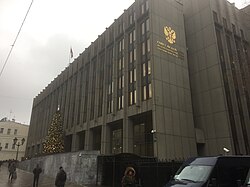This article needs additional citations for verification. (December 2023) |
Federation Council Совет Федерации Sovet Federatsii | |
|---|---|
| Federal Assembly of Russia | |
 | |
| Type | |
| Type | |
| History | |
| Founded | 1993[1] |
| Preceded by | Soviet of Nationalities Constitutional Conference of Russia |
| Leadership | |
| Structure | |
| Seats | 177[a] |
 | |
Political groups |
|
Length of term | 5 years |
| Elections | |
Last election | 12 December 1993 (Formation process changed since December 1995, abolishing the elections) |
| Meeting place | |
 | |
| 26 Bol'shaya Dmitrovka, Moscow | |
| Website | |
| council | |
 |
|---|

The Federation Council,[b] unofficially Senate,[c] is the upper house of the Federal Assembly of Russia. It was established by the Constitution of the Russian Federation in 1993.
Each of the 89 federal subjects of Russia (including two annexed in 2014 and four more in 2022, – consisting of 24 republics, 48 oblasts, nine krais, three federal cities, four autonomous okrugs, and one autonomous oblast – sends two senators to the Council, for a total membership of 178 Senators. In addition, the Constitution also provides for senators from the Russian Federation, which can be no more than 30 (up to seven of them for life), as well as (optionally) former presidents as life senators (as of 2020[update] there are no such life senators).
The council holds its sessions within the Main Building on Bolshaya Dmitrovka Street in Moscow, the former home of the Soviet State Building Agency (Gosstroy), with further offices and committee rooms located on New Arbat Avenue. The two houses of the Federal Assembly are physically separated, with the State Duma residing in another part of Moscow on Okhotny Ryad Street. Sessions of the Federation Council take place in Moscow from 25 January to 15 July and from 16 September to 31 December. Sessions are open to the public, although the location of sessions can change if the Federation Council so desires, and secure closed sessions may be convoked.
For purposes of succession, the speaker (chairman) of the Federation Council is the third-highest position in the Russian Federation, after the president and the prime minister. In the case of incapacity of the president and prime minister, the chairman of the Federation Council becomes the Acting President of the Russian Federation.[2][3]
- ^ "Federal Assembly of the Russian Federation". Archived from the original on 2020-05-03. Retrieved 2020-04-30.
- ^ "Пост Председателя Совета Федерации РФ – это третий пост в стране. В случае недееспособности президента и премьера именно председатель верхней палаты парламента должен возглавить государство."
- ^ "Почему у нас третье лицо в государстве Председатель Совета Федерации? Потому что это федерация, он не распускается, он действует постоянно." - Сергей Шахрай
Cite error: There are <ref group=lower-alpha> tags or {{efn}} templates on this page, but the references will not show without a {{reflist|group=lower-alpha}} template or {{notelist}} template (see the help page).